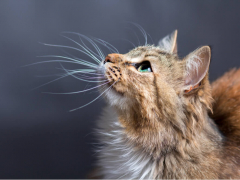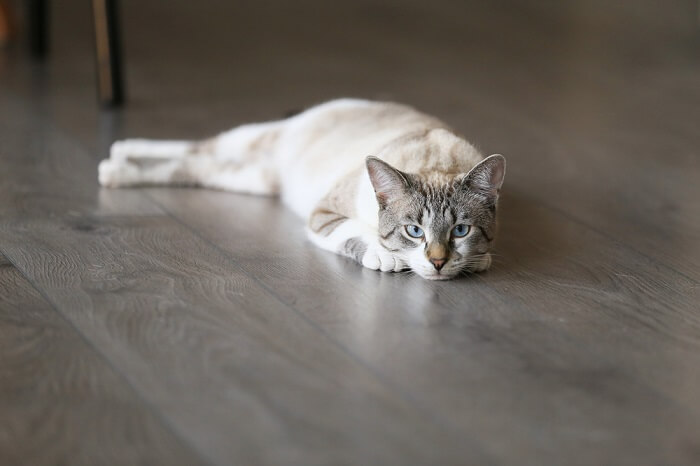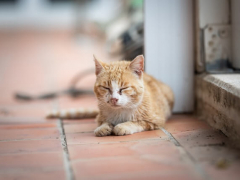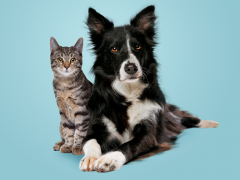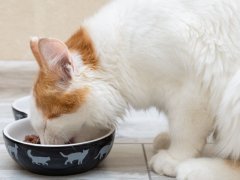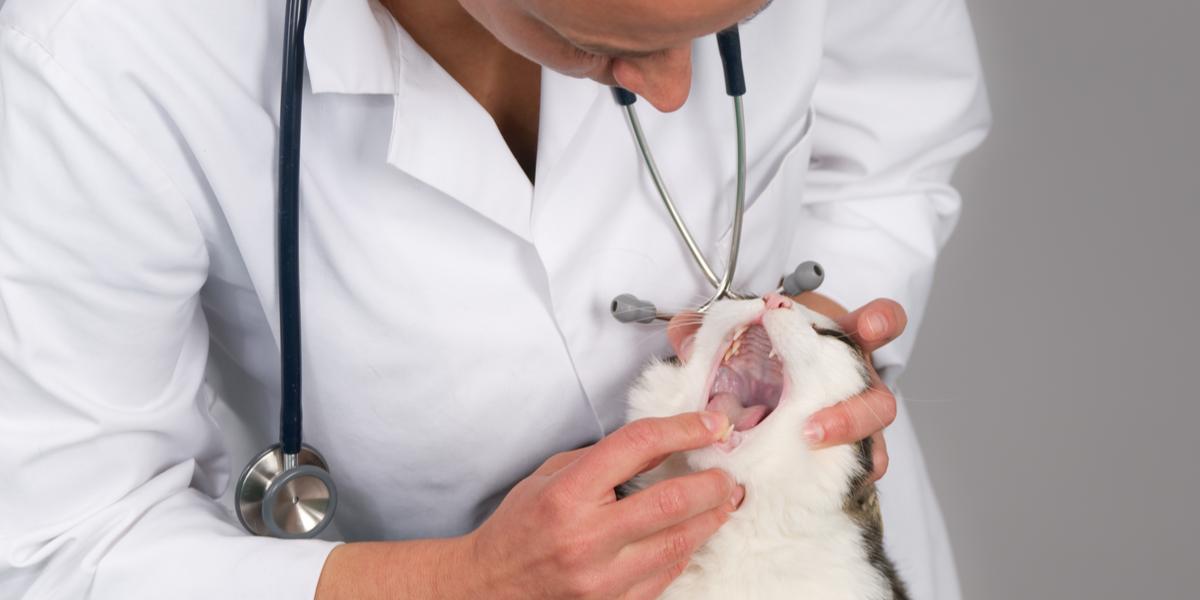
This article aims to explain the details of mouth ulcers in cats, providing a simple, clear explanation about mouth ulcers for pet owners whose cats may be affected, and who want to understand more about what’s happening.
What Are Mouth Ulcers in Cats?
An ulcer is an open sore caused by a break in the skin or mucous membrane that fails to heal. Ulcers may appear inside or outside the body. In the mouth, this means a break in the mucous membrane that lines the oral cavity.
A cat with mouth ulcers has sore areas in the oral cavity. Mouth ulcers are also known as mouth sores or oral ulcers. Ulcers appear raw and red, and they can be seen as obvious deficits in the smooth mucous membrane that covers the inside of the lips, gums, tongue, hard palate, and other structures.
Mouth ulcers are often seen as part of a general disease known as feline stomatitis, which mean inflammation of the oral cavity, with concurrent gingivitis (inflammation of the gums) and/or gingivostomatitis (inflammation of the oral cavity and gums). This type of periodontal disease is often linked to immune-based conditions and dental disease. Mouth ulcers are seen as specific lesions in an oral cavity, which is generally inflamed.
What Are the Symptoms of Mouth Ulcers in Cats?
Mouth ulcers are painful, and this accounts for many of the clinical signs seen in a cat with mouth ulcers.
- Vocalization (e.g., meowing, yowling) when the mouth is opened
- Refusal to eat, despite going to the food bowl as if hungry
- Loss of appetite
- Eating from one side of the mouth, or dropping food when eating
- Weight loss
- Pawing at the mouth
- Bad breath (halitosis)
- Drooling (excessive salivation, technically called “ptyalism”)
- Poor coat condition (cats stop self grooming because of pain in the mouth)
- Red and/or swollen gums
- Sneezing is sometimes seen, if the condition is linked to a viral infection
What Causes Ulcers in a Cat’s Mouth?
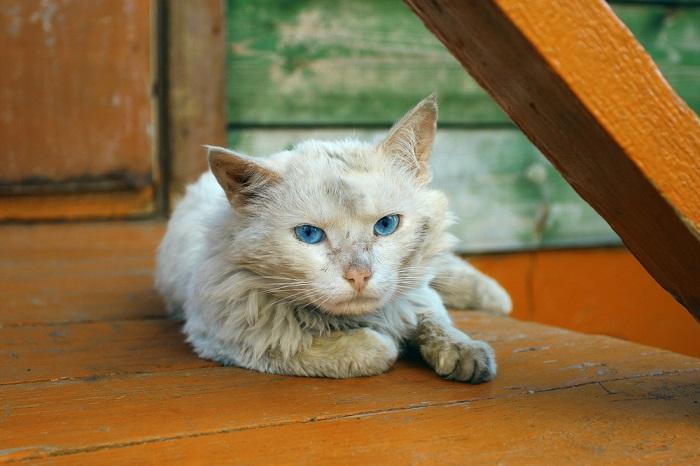
Mouth ulcers can be caused by many things, including viral infections, bacterial infections, and diabetes.
Mouth ulcers can be caused by anything that results in inflammation of the lining of the mouth. Common causes include:
- Viral infections like feline calicivirus and to a lesser extent, feline herpes virus (these are both cat flu viruses), as well as feline immunodeficiency virus and feline leukemia virus
- Bacterial infections
- Physical irritants, such as hairballs or foreign objects
- Other diseases (tumors, such as squamous cell carcinoma)
- Allergic reactions to foods and other substances, leading to oral versions of immune system based conditions, such as eosinophilic granuloma
- Systemic diseases (e.g., renal failure, diabetes mellitus)
How Common Are Mouth Ulcers?
Mouth ulcers are very common in cats of all ages.
Diagnosis of Mouth Ulcers
If you suspect your cat may have mouth ulcers, you should take them to see your veterinarian who will try to determine the underlying cause of the mouth ulcers so that appropriate treatment can be given.
Detailed History Taking
Your vet will discuss every aspect of your cat’s condition and general pet health, looking for clues about why the ulcers have developed, and in particular finding out about anything that might be directly causing the ulcers.
This will include asking about your pet’s vaccination status, dietary history (including any supplements given), parasite control (e.g., checking for fleas as a routine part of a health check), and contact with other cats.
Physical Examination
Your veterinarian will check your cat over carefully, looking for mouth ulcers, as well as any possible reasons for them developing. This will include a close inspection of the mouth, including the gums, tongue, and all of your cat’s teeth, including premolars and molars, as well as an overall general examination.
Routine Blood Tests and Urinalysis
It’s very likely that your veterinarian may carry out blood work, including the usual panel of diagnostic tests, such as hematology (complete blood count with assessment of blood cells) and biochemistry profiles. With mouth ulcers, typically there may not be many abnormalities, but it is still important to check.
Systemic illness that can contribute to mouth ulcers will be ruled out (such as liver disease, kidney disease, diabetes, etc.) because the blood parameters reflecting these areas of the body will usually be normal indicating that your cat’s health is generally good.
Urinalysis will be carried out as with many other sick cats, as part of a general investigation as a routine part of good veterinary medicine.
Specialized Blood Tests
Your veterinarian may recommend specific blood tests for some viral infections, such as feline leukemia virus (FeLV) and feline immunodeficiency virus (FIV), since these can be linked to the underlying cause of mouth ulcers and there are significant implications if your cat is positive for either of these.
Other Tests
- Radiographs (x-rays) may be taken of the skull to check for deeper aspects of dental disease.
- In complex or long-standing cases, a biopsy may be taken of the ulcerated areas. This is the only definitive way to confirm a diagnosis certain specific causes of mouth ulcers (e.g., tumors).
Your veterinarian will advise you on which detailed investigations are needed.
How Do You Treat Mouth Ulcers in Cats?
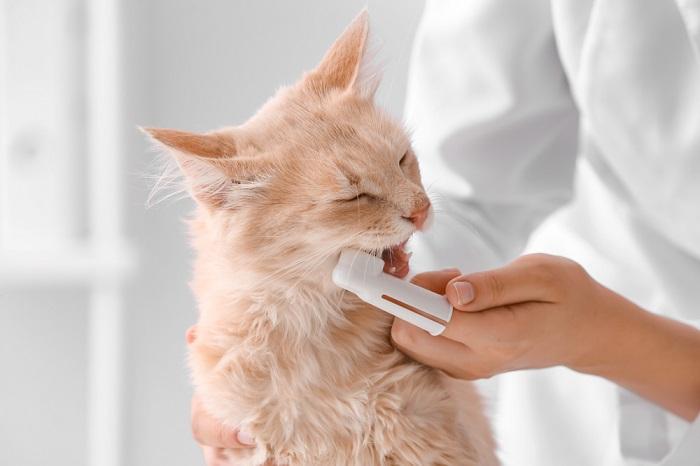
To prevent inflammation in the mouth, your vet might recommend starting a home dental care routine.
In general, treatment is designed to address the underlying cause of mouth ulcers.
- Pain medication may be given to relieve discomfort.
- Soft food may be recommended to make eating less painful.
- Antimicrobial therapy may be prescribed if bacterial infection is contributing to the issue.
- Corticosteroids may be given to reduce oral inflammation.
- Dental cleaning will be discussed. Buildup of dental calculus is often linked to inflammation in the mouth, and a good dental care regime at home, including tooth brushing, is an important part of oral hygiene.
- Affected cats often need ongoing treatment for months or years.
- Specific treatment may also be given for the underlying cause if this can be identified.
- Some causes may have already been removed and the patient simply needs to be stabalized (e.g., ingestion of irritant substances).
- Other diseases like tumors may require surgical intervention.
Mouth Ulcer Treatment for Humans vs. Cats
In humans, topical treatments for ulcers (gels, liquids) are often used to relieve pain. There are no such licensed products for cats, and any products that are used “off label” should be used with care under veterinary supervision. It’s a mistake to presume that medications for humans will be effective and safe in cats. Examples of products that may have been used include the “magic mouthwash” that is used for esophageal ulcers in humans, which may contain sucralfate and lidocaine, as well as other ingredients.
There are very significant differences between humans and cats which affect how products may or may not work.
- Humans can hold fluid in their mouths, then rinse afterward. Cats cannot do this.
- A product may give relief for a few minutes, and humans can repeat the application. This is difficult with cats, as if the mouth is sore, they are unlikely to stay still for repeat applications.
- There are other risks, too, such as a cat biting their tongue if a numbing product is applied to the oral cavity. Humans cognitively realize that they ought not to do this, but cats do not have this ability. A numbing product may also upset the function of the larynx, leading to an accidental inhalation of food or fluids.
- There are also possibly toxicity issues when products used for humans are used in cats.
Treating oral ulcers on cats means resolving the primary cause of the ulceration and supporting the cat nutritionally and with pain relief until the ulcers heal.
Monitoring and Prognosis
Your veterinarian will advise you on what follow-up care is needed, but in general, monitoring your pet is the main way to confirm that a full recovery is underway.
The prognosis for most cases of mouth ulcers is reasonable.
Conclusion
Mouth ulcers are a common and painful condition in cats, but once the cause of the problem has been identified, effective treatment is often available.
Frequently Asked Questions
How long do mouth ulcers last in a cat?
Mouth ulcers do not resolve by themselves, and they can continue to cause problems for months or years if not treated effectively. They are painful, and that is why it is important to see a veterinarian for prompt treatment.
How can I treat my cat's mouth ulcer at home?
There are no simple home remedies for mouth ulcers in cats. You need to seek professional help from a vet. It does help to have a good home dental care regime, with tooth brushing, and soft food also helps. But these are not enough on their own to treat mouth ulcers.
How is a mouth ulcer in a cat different from a human mouth ulcer?
The most common cause of human mouth ulcers is injury (e.g., accidentally biting the inside of your cheek). In most cases, human mouth ulcers are harmless and resolve by themselves in 10 to 14 days without the need for treatment. This does not happen in cats. Humans also suffer from a different specific issue, aphthous ulcers, which are recurring ulcers with no known cause that affect around 20% of the population. Cats do not get these.
What are the symptoms of ulcers in a cats mouth?
Mouth ulcers are painful, and this accounts for many of the signs seen cats, including inappetence, drooling, pawing at the mouth, and weight loss.
What can I do for my cat if he has a mouth ulcer?
Mouth ulcers in cats do not get better by themselves, so you should bring your cat to your veterinarian so that the source of the problem can be identified and the issue treated properly.
When should I take my cat to the vet for mouth ulcers?
Ulcers are painful, so if your cat has mouth ulcers, they should be taken to the vet as soon as possible.
